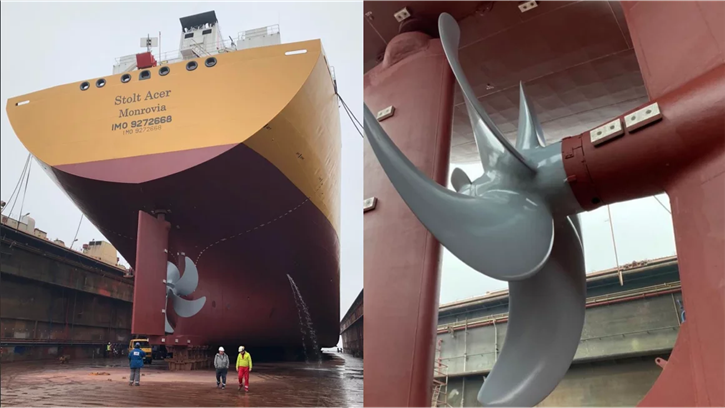
GIT to help Stolt Tankers support healthier oceans and waterways
Stolt Tankers has become the first chemical tanker company to apply graphene-based propeller coatings from Graphite Innovations & Technology (GIT) to its fleet. Under a two-year agreement, GIT’s XGIT-PROP graphene-based marine coating will be applied to the propellers of 25 of Stolt’s vessels during 2023.
XGIT-PROP is an eco-friendly product that reduces biofouling and improves propulsion efficiency while ensuring no harmful toxins and biocides are released into the ocean. Stolt Tankers regards GIT’s propeller coatings as a simple way to maximize fuel savings and lower emissions.
In April 2022, Stolt Tankers completed a trial of a GIT graphene-based propeller coating on the Stolt Acer. The company noted a significant reduction in fuel consumption and subsequently applied the coating to five additional ships. It is expected that the coatings will reduce biofouling impacts and noise emissions, while improving fuel efficiency.
GIT’s XGIT-PROP is a two- to three-layered application of a graphene-based propeller coating that is designed to release the biofouling growth on ship propellers and reduce the required frequency of propeller ‘polishings’ or cleanings. It also maintains the propulsive efficiency of the propeller and reduces damage resulting from cavitation, lowering noise emissions.
New carbon-neutral facility for Graphite Innovation and Technologies
Graphite Innovation and Technologies (GIT) is moving to a new carbon-neutral facility in Dartmouth, Nova Scotia. The company, which is focused on producing sustainable products for the maritime transportation sector, has outgrown its existing space and is moving to a new state-of-the-art facility that is four times larger.
The additional space will allow GIT to create new eco-friendly production technologies, as well as expand further into European, Middle Eastern and Asian markets. The site improvements are expected to be completed by this autumn.
The Government of Canada, through the Atlantic Canada Opportunities Agency (ACOA), is contributing $950,000 in repayable funds to help GIT establish operations in the new facility. The investment will also permit GIT to enhance the production of its eco-friendly products that support the decarbonization goals of shipping and marine-focused organizations worldwide.
